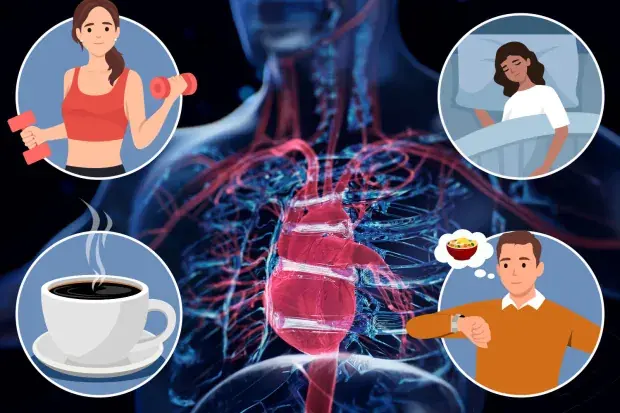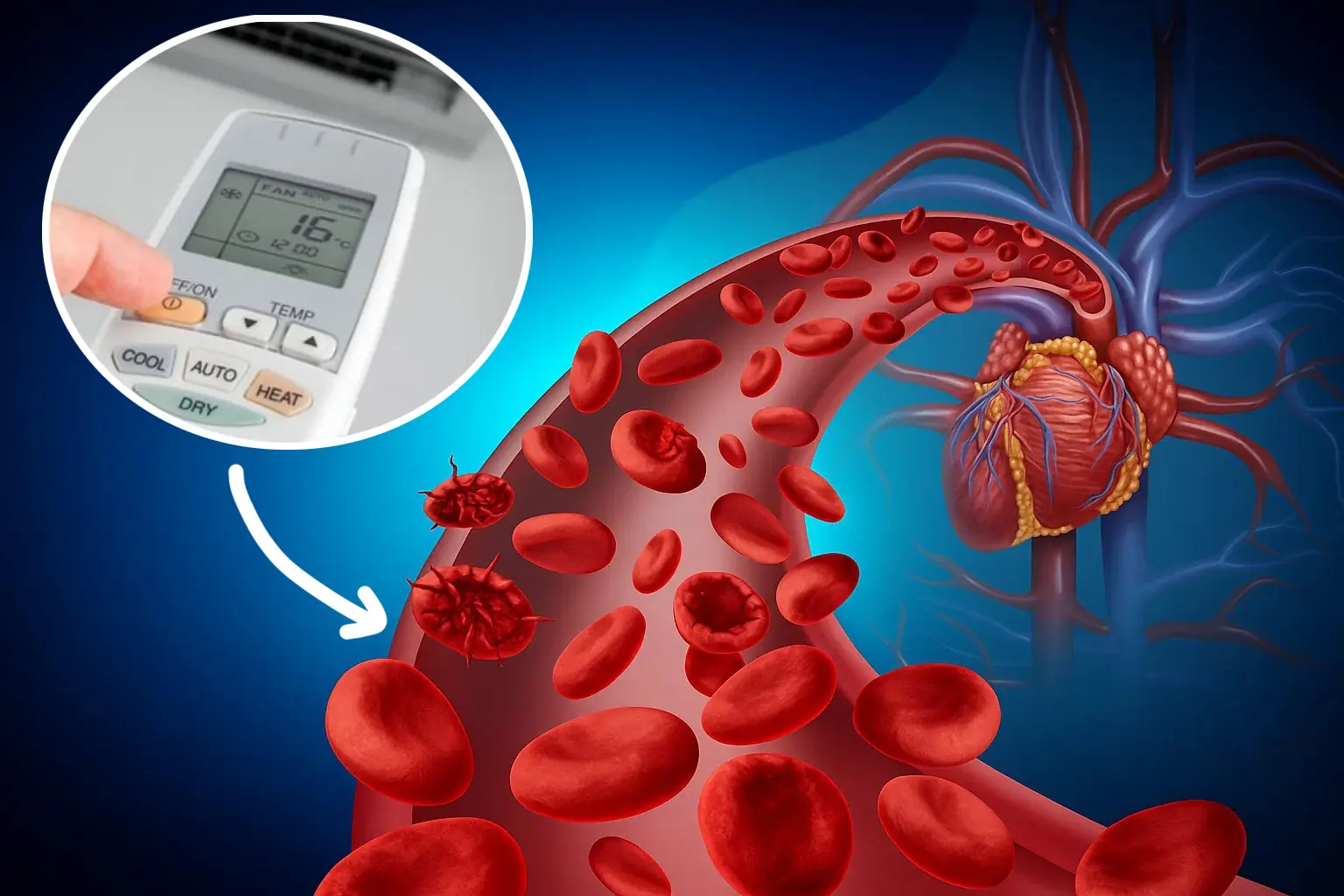
An unusual abdominal sign warns of severe fa:tty l!ver: If you see it, get checked immediately.
A gastroenterologist has suggested how to recognize fatty liver disease from an unusual sign in the abdomen.

Discovering a Potential New Approach to Alzheimer’s: A Protein from Stomach Bacteria May Help Block Alzheimer’s-Related Proteins
A groundbreaking discovery in the fight against Alzheimer’s disease may lie within a surprising source—Helicobacter pylori, the bacteria commonly known for causing stomach ulcers. Scientists have recently found that a protein fragment derived from this bacterium has the potential to block the accumulation of harmful proteins, namely amyloid-beta and tau proteins, which are considered the hallmark toxic agents in Alzheimer’s disease.
What the New Research Reveals
In a series of laboratory experiments, researchers discovered that a protein fragment from Helicobacter pylori, known as CagAN, could dramatically reduce the formation of these brain-damaging clumps, even when present at very low concentrations. The protein didn’t only target amyloid-beta and tau proteins linked to Alzheimer’s but also showed activity against amyloids related to Parkinson’s disease and type 2 diabetes. This raises the possibility of using this bacterium-derived protein for a broader therapeutic approach to multiple neurodegenerative diseases.
The findings mark a new direction in Alzheimer’s research. Traditionally, scientists have focused on clearing amyloid plaques, but with limited success. The CagAN protein offers a fresh perspective—not by eliminating the H. pylori bacteria but by understanding how its beneficial components could be preserved or mimicked to prevent the accumulation of harmful proteins in the brain.
Implications for Alzheimer's Treatment
Although this research is still in its early stages and has yet to be tested on animals or humans, the results are promising. The idea that a common bacterium could hold the key to preventing the buildup of Alzheimer’s-related proteins challenges long-standing assumptions about the relationship between the gut microbiome and brain health. It also opens the door to new, more targeted treatments that could offer hope for those affected by Alzheimer's and other neurodegenerative diseases.
By harnessing the beneficial aspects of Helicobacter pylori or its proteins, such as CagAN, scientists could develop new therapies that help protect the brain from damage while addressing the root causes of neurodegenerative diseases. The potential to create precision microbiome-based treatments represents a shift toward more personalized approaches to medicine, where the focus is not just on the removal of harmful agents but also on optimizing the body's natural defenses.
Potential Impact on Other Diseases
The same protein that showed promise against Alzheimer’s also interfered with amyloids associated with Parkinson’s disease and type 2 diabetes. This suggests that the therapeutic potential of CagAN extends beyond just Alzheimer’s, opening up opportunities to treat other conditions linked to protein aggregation in the brain and elsewhere in the body.
Looking Ahead: The Road to Human Trials
While the research is in its infancy, it provides hope for future treatments that could slow or even reverse the damage caused by Alzheimer’s and other neurodegenerative conditions. The challenge now is to move beyond lab experiments to animal and human trials, where the safety and effectiveness of CagAN as a therapeutic agent can be fully assessed.
Conclusion
The discovery that a protein from Helicobacter pylori could potentially block the proteins that cause Alzheimer’s disease marks a new frontier in our understanding of neurodegenerative diseases. Although much work remains to be done, this breakthrough has the potential to reshape how we approach treatment for Alzheimer’s, Parkinson’s, and type 2 diabetes. By focusing on the microbiome and harnessing the beneficial elements it contains, scientists may unlock new, targeted therapies that could transform the lives of millions.
Sources:
NeuroScienceNews, "Helicobacter Pylori Protein Blocks Alzheimer’s-Related Proteins"
Medical News Today, "Helicobacter pylori protein CagAN could hold the key to Alzheimer’s disease treatment"
Nature Communications, "Microbiome and Brain Health: Exploring New Pathways in Neurodegenerative Disease Treatment"

A gastroenterologist has suggested how to recognize fatty liver disease from an unusual sign in the abdomen.

Stunned after receiving the health check results, the 33-year-old woman still felt fortunate because she had detected the dangerous disease in time and still had a chance for treatment.

If you want to buy good and clean oysters to eat, you must immediately avoid these types.

The 'beautiful' things may have deceived you!

Green pots, plush bears, and small decorative items are all commonly seen objects in the bedrooms of many families. However, they can completely affect your health.

In hot weather, many people have the habit of showering 2-3 times a day to cool down their bodies. However, is this habit good for health?

A 22-year-old young man named Wang Yi, from Taiwan (China), went for a check-up and was unexpectedly diagnosed with kidney failure, fatty liver disease, and gout.

The liver is an important detoxifying organ of the body. However, some familiar vegetables in daily meals can become silent 'enemies,' harming the liver if not used properly.

Having breast cancer but not going to the hospital for treatment, instead opting for honeybee stings at home, the woman in Ho Chi Minh City has to bear the heavy consequences as the tumor complicates and metastasizes to many places.

Some hereditary cancers related to genetic mutations, such as breast cancer, ovarian cancer, and prostate cancer, can be managed and screened early thanks to genetic counseling.

If you continuously experience headaches, loss of appetite, dry cough, and continuous weight loss... you need to see a doctor immediately as this could be a sign of cancer.

Fruit is good for you, but certain kinds contain a lot of sugar. Overeating can impact your health by raising blood sugar levels.

Learn about the link between Helicobacter pylori infection and stomach canc3r. Discover how this common food and waterborne bacteria could lead to silent canc3r and how early detection and treatment can help prevent it.

Discover 5 easy daily habits that can significantly reduce the risk of heart attack and stroke. From exercise to diet, learn how small lifestyle changes can protect your heart and improve overall health.

Discover the 4 common facial signs of fatty liver disease (NAFLD) like puffiness, skin discoloration, and acne. Learn how liver health affects your skin and when to seek medical help.

Discover how vitamin D can reduce tooth decay by 50%. Learn about its role in preventing dental caries, the link between vitamin D and oral health, and more in this detailed guide.

There are other causes of "damaging blood vessels" besides eating a lot of fatty meat and fatty foods. Three frequent summertime activities can also damage blood vessels, according to physicians.

Discover the top seeds and drinks recommended by Dr. Saurabh Sethi to reduce bloating. Learn about sesame, flax, chia seeds, and drinks like ginger tea, kefir, and more.

Many people have used their teeth, the edge of a table, or the armrest of a chair to open beer bottle caps – both dangerous and likely to cause damage. In fact, there is a special 'weak point' on beer bottle caps. Just aim correctly at this spot, and yo

High blood sugar levels can lead to dehydration, which causes your skin to become dry and itchy. This symptom may seem minor (as dry skin is quite common), but is often overlooked. Persistent dry skin (even after applying lotions) could be a warning sign

A gastroenterologist has suggested how to recognize fatty liver disease from an unusual sign in the abdomen.

Stunned after receiving the health check results, the 33-year-old woman still felt fortunate because she had detected the dangerous disease in time and still had a chance for treatment.

If you want to buy good and clean oysters to eat, you must immediately avoid these types.

The 'beautiful' things may have deceived you!

Green pots, plush bears, and small decorative items are all commonly seen objects in the bedrooms of many families. However, they can completely affect your health.

In hot weather, many people have the habit of showering 2-3 times a day to cool down their bodies. However, is this habit good for health?

A 22-year-old young man named Wang Yi, from Taiwan (China), went for a check-up and was unexpectedly diagnosed with kidney failure, fatty liver disease, and gout.

The combination of rice, flaxseed, and other nourishing ingredients offers numerous benefits, from boosting hydration to fighting free radicals and improving skin texture. Follow this routine consistently, and you’ll be on your way to achieving the cove

The liver is an important detoxifying organ of the body. However, some familiar vegetables in daily meals can become silent 'enemies,' harming the liver if not used properly.

Discover the inspiring life of Ruby Middleton Forsythe, a dedicated educator who shaped the future of African-American children in South Carolina, teaching for over six decades despite adversity.

Discover the inspiring story of a 14-year-old girl who took the initiative to get a job, worked hard, and is saving for her future. Learn how determination and responsibility are shaping her dream to become a doctor.

Having breast cancer but not going to the hospital for treatment, instead opting for honeybee stings at home, the woman in Ho Chi Minh City has to bear the heavy consequences as the tumor complicates and metastasizes to many places.

A family's challenging flight with a crying 4-month-old was transformed by the extraordinary kindness of a WestJet flight attendant. Discover this heartwarming story of empathy and going above and beyond in customer service.

Discover the powerful story of Sharon, a mother-in-law whose quiet resilience and unwavering love carried her family through cancer, caregiving, and grace under pressure.

An elderly customer's request for a $10 withdrawal led to a viral moment of hidden wisdom. This compelling story reveals how patience and respect for elders can transform interactions, offering a powerful lesson in customer service and human dignity.

By incorporating these DIY treatments into your routine, you can achieve healthier, shinier, and fuller hair—without relying on harsh chemicals or expensive products.

Some hereditary cancers related to genetic mutations, such as breast cancer, ovarian cancer, and prostate cancer, can be managed and screened early thanks to genetic counseling.

Discover the extraordinary life of Katherine Swynford, from a lady-in-waiting to a duchess, her deep love story with John of Gaunt, and the lasting impact of her children, the Beauforts, on English history.

If you continuously experience headaches, loss of appetite, dry cough, and continuous weight loss... you need to see a doctor immediately as this could be a sign of cancer.

A wife and mother of three, balancing work, school, and household chores, snaps when her family constantly complains about household upkeep. She tells them to step up or deal with it themselves, but now doubts if she went too far.